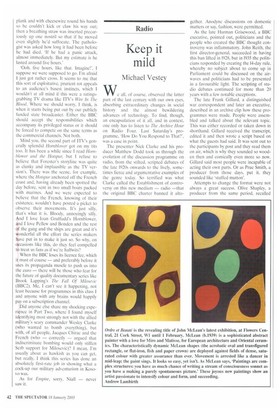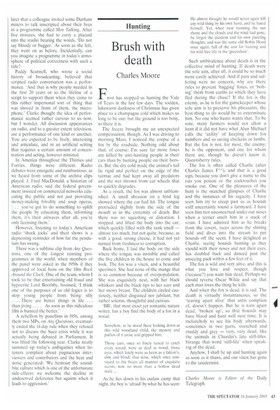Radio
Keep it mild
Michael Vestey
We all. of course. observed the latter part of the last century with our own eyes, absorbing extraordinary changes in social history and the almost bewildering advances of technology. To find, though, an encapsulation of it all. and in context, one only has to listen to The Archive Hour on Radio Four. Last Saturday's programme, 'How Do You Respond to That?', was a case in point.
The presenter Nick Clarke and his producer Matthew Dodd took us through the evolution of the discussion programme on radio, from the stilted, scripted debates of the late 1920s onwards to the lively, sometimes fierce and argumentative examples of the genre today. So terrified was what Clarke called the Establishment of controversy on this new medium — radio —that the original BBC charter banned it alto
gether. Anodyne discussions on domestic matters or say, fashion, were permitted.
As the late Harman Grisewood, a BBC executive, pointed out, politicians and the people who created the BBC thought controversy was inflammatory. John Reith, the first director-general, succeeded in having this ban lifted in 1928, but in 1935 the politicians responded by creating the 14-day rule, whereby no subject about to come up in Parliament could be discussed on the airwaves and politicians had to be presented in a favourable light. The scripting of studio debates continued for more than 20 years with a few notable exceptions.
The late Frank Gillard, a distinguished war correspondent and later an executive, described in an archive clip how these programmes were made. People were assembled and talked about the relevant topic. This was either recorded or taken down in shorthand. Gillard received the transcript, edited it and then wrote a script based on what the guests had said. It was sent out to the participants by post and they read them on air, which is why they sounded so wooden then and comically even more so now. Gillard said most people were incapable of acting their own parts. Or as Prue Smith, a producer from those days, put it, they sounded like 'stuffed mutton'.
Attempts to change the format were not always a great success. Olive Shapley, a producer from the same period, recalled
later that a colleague invited some Durham miners to talk unscripted about their lives in a programme called Men Talking. After five minutes, she had to carry a placard into the studio bearing the words, `Do not say bloody or bugger,' As soon as she left, they went on as before. Incidentally, can you imagine a programme in today's atmosphere of political correctness with such a title?
Paddy Scannell, who wrote a social history of broadcasting, believed that scripted radio conversation was a performance. 'And that is why people needed in the first 20 years or so the lifeline of a script to support them when they came to this rather impersonal sort of thing that was shoved in front of them, the microphone.' Clarke thought the idea of performance seemed rather curious to us now, but I wonder. All discussion appearances on radio, and to a greater extent television, are a performance of one kind or another. You are expected to be lively, interesting and articulate, and in an artificial setting that requires a certain amount of concentration and acting, however minimal.
In America throughout the Thirties and Forties, things were different. Radio debates were energetic and rumbustious, as we heard from some of the archive clips played. J. Fred MacDonald, a historian of American radio, said the federal government insisted on commercial networks educating the public and not just providing money-making frivolity and soap operas, you've got to do something to uplift the people by educating them, informing them, it's their airwaves after all, you're only licensing them.'
However, listening to today's American radio 'shock jocks' and their shows is a depressing reminder of how far the pendulum has swung.
There was a sublime clip from Any Questions, one of the longest running programmes in the world, when members of the panel were asked in the 1950s if they approved of local bans on the film Rock Around the Clock. One of the team, whom I took to be that entertaining old fraud and hypocrite Lord Boothby, boomed, 'I think one of the purposes of us old fogies is to stop young people from being silly . . . . There are better things in life ... than jiving ... . As soon as this ridiculous film is banned the better.'
A rebellion by panellists in 1956, among them two MPs, on Any Questions, eventually ended the 14-day rule when they refused not to discuss the Suez crisis while it was actually being debated in Parliament. It was lifted the following year. Clarke neatly summed up today's ambiguities when listeners complain about pugnacious interviewers and contributors and the heat and noise generated: 'We bemoan the soundbite culture which is one of the unfortunate side-effects; we welcome the decline in undeserved deference but squirm when it leads to aggression.'



























































 Previous page
Previous page